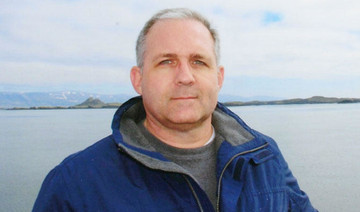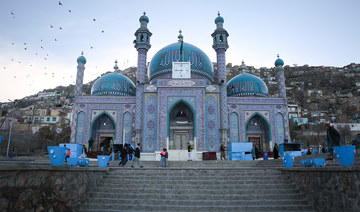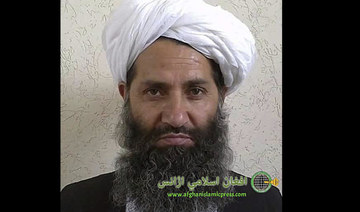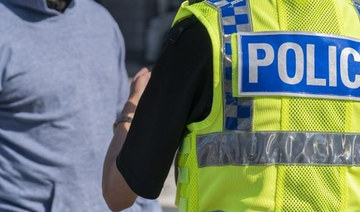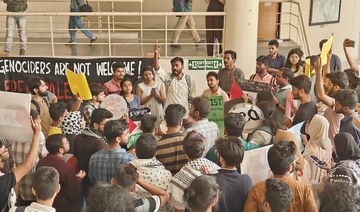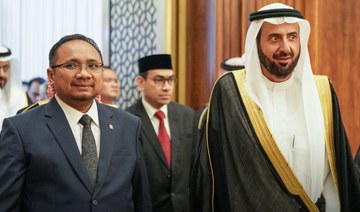WASHINGTON: A US corporate security executive and former Marine who has been jailed in Moscow on spying charges has spent more than a decade cultivating friends and contacts in Russia, both virtual and real.
Paul Whelan sought out friends throughout the country, most often through a social networking site that is similar to Facebook and popular largely in Russia. Several told The Associated Press that the American never seemed sinister, merely someone who was interested in Russia and wanted to be pen pals.
“I know him as a friendly, polite, educated, and easygoing guy,” said one of his contacts, who, like the other Russians interviewed for this story, spoke on condition of anonymity because of Whelan’s legal troubles.
Whelan was arrested Dec. 28 while on a two-week visit to the country and has been charged with espionage. The Russian government has so far given no details about the allegations against him, but a close look at his social media history suggests why he might have come to the attention of the Russian security services, regardless of his motives.
He has collected dozens of contacts on the social media site, nearly all of them men, many of whom have at least some connection to the military.
His family back home says he was nothing more than a tourist. In a Washington Post op-ed published Friday, his twin brother, David, urged the US government to pressure Russia to release him.
“Paul is a kind and considerate brother, son and uncle, and a generous and loyal friend,” he wrote. “He travels as often as he can, both for work and pleasure. He is many things to many people, but he is not a spy.”
Whelan, 48, could face up to 20 years in prison if convicted of spying. He is also a citizen of Britain, Canada and Ireland, which brings international pressure on Russia from several fronts. He was born in Canada to British parents, but grew up in Michigan, where he now lives.
His family said he was in Moscow over the holidays for the wedding of a fellow former Marine and had planned to travel to St. Petersburg before flying home this weekend. Instead he’s in Lefortovo, a notorious prison run by the KGB in Soviet times and still used for foreigners accused of spying.
Whelan has been visiting Russia since at least 2007, when he took advantage of a military program for Marines deployed in Iraq that gave them 15 days of leave and paid for the travel.
Even before then, he had begun developing a network of contacts throughout Russia. Some said they met him online in 2006 and became “pen pals,” trading practice in English for Russian. Whelan seemed fascinated with Russia and its culture, they said.
For nearly a decade, he has had an account on VKontakte, which means In Contact. Of his 58 friends at the time of his arrest, 54 were men. Many attended universities affiliated with the military, civil aviation or technical studies. Many share his interest in sports and firearms.
“We was guys with guns,” wrote another of his friends, who said he was a student working nights as a security guard when he first met Whalen online.
Both men, who live in separate Russian cities far from Moscow, said they first met Whelan in person in 2008 when he traveled around the country to meet some of his new friends. Others said they have only communicated online.
Whelan’s brother said it would not be surprising to find Russian soldiers among his contacts.
“I’m pretty sure that some of the people he knows through social media are probably Russian soldiers because there are a lot of Russian soldiers and he probably knows one,” David Whelan said in an interview.
One of Paul Whelan’s friends on VKontakte said he believed the arrest was a mistake because a true spy would never act as openly as he did. He said Whelan gave him his home address and they exchanged Christmas cards.
Former CIA officers also have expressed doubts that Whelan was working for US intelligence. They note that the CIA would be unlikely to use someone in Russia without diplomatic immunity and leave them vulnerable to arrest.
Whelan’s Marine record also would likely prevent US intelligence from hiring him. He began active duty with the Marines in 2003 and was deployed twice to Iraq, rising to staff sergeant. But his military career ended with a court martial in 2008, when he was convicted on charges that included attempted larceny and dereliction of duty.
Court documents released by the military show he was accused of attempting to steal more than $10,000 while on duty in Iraq, where he worked as a clerk, in September 2006. He was also convicted of using a false social security number and profile for a military computer system to grade his own examinations, and of writing 10 bad checks totaling around $6,000.
He was dropped two grades in rank and given a bad conduct discharge from the Marine Corps.
“This guy is not an intel asset,” said Malcom Nance, a veteran intelligence officer. “He’s not the type of person you would use as an asset. There is no way.”
Nance said he suspects Russian intelligence officers have been watching Whelan for years, wondering if they could use him in some way and maybe trying to flip him.
A member of Russia’s parliament suggested Friday that once the investigation into Whelan was completed, he could be swapped for Maria Butina, a Russian woman jailed in the US since July. She pleaded guilty last month to conspiring to act as a foreign agent by trying to infiltrate conservative circles and the National Rifle Association to influence US politics.
However, she has been cooperating with federal prosecutors and is unlikely to spend too much time behind bars. Federal sentencing guidelines call for no jail time to six months.
After his discharge, Whelan returned to his job in the temporary staffing company Kelly Services, based in Troy, Michigan, where he had worked since 2001 in the IT department until taking the leave of military absence. He was Kelly’s head of global security and investigations until 2016.
Early the following year, Whelan joined auto parts supplier BorgWarner as global security director. BorgWarner, based in Auburn Hills, Michigan, has facilities around the world but none in Russia and he never traveled to the country for business, company spokeswoman Kathy Graham said.
Jailed American spent years collecting Russian contacts
Jailed American spent years collecting Russian contacts

- Whelan, 48, could face up to 20 years in prison if convicted of spying. He is also a citizen of Britain, Canada and Ireland, which brings international pressure on Russia from several fronts
US defends talking to Taliban in Afghanistan
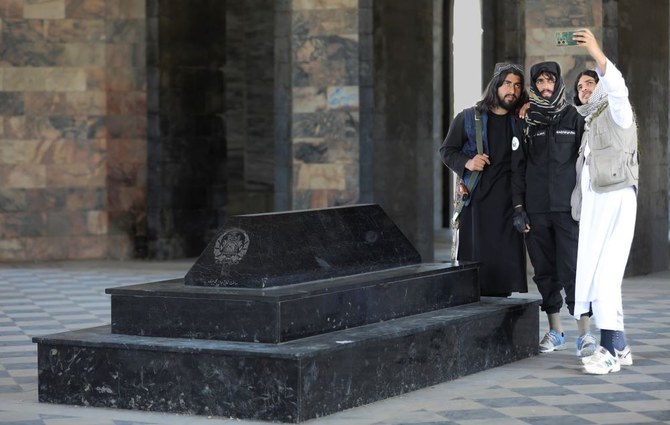
- Dialogue works in US interests, supports Afghan people, State Department says
- Taliban took power in 2021 following withdrawal of US-led coalition
LONDON: The US State Department has defended talking to the Taliban in order to serve Washington’s interests in Afghanistan and the wider region.
The department’s principal deputy spokesperson, Vedant Patel, told reporters that talking with the group not only worked in US interests but supported “the Afghan people.”
The Taliban took control of Afghanistan in 2021 following the withdrawal of US-led coalition forces and the collapse of the Western-backed Afghan government.
They have drawn significant hostility on the international stage for their repression of people, especially their treatment of women and girls, limits on education and reintroduction of violent punishment.
Some fear engaging with the Taliban could lend them legitimacy, but Patel said dialogue between the group and the US “allows us to speak directly with the Taliban, and it’s an opportunity for us to continue to press for the immediate and unconditional release of US nationals in Afghanistan, including those who we have determined to be wrongfully detained.”
“We’ll also use those opportunities to directly talk about the Taliban’s commitments to counterterrorism and of course, as always, human rights is also on the agenda,” he said.
British police officer pleads guilty to terror charges for showing support for Hamas
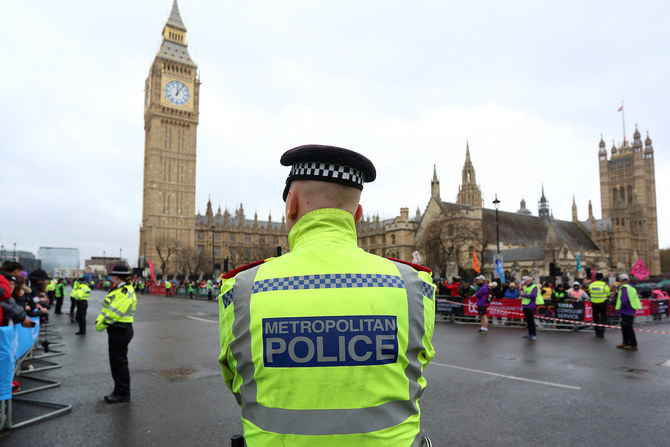
- Adil pleaded guilty in Westminster Magistrates’ Court to two counts of publishing an image in support of a proscribed organization in violation of the Terrorism Act
- Two other police officers who were concerned by the images reported Adil to superiors
LONDON: A British police officer pleaded guilty Thursday to terror charges for showing support on social media for Hamas, which is designated a terror group and banned in the UK.
West Yorkshire constable Mohammed Adil admitted sharing two images on WhatsApp supporting the group three weeks after Hamas and other Palestinian militants stormed into Israel on Oct. 7 and killed about 1,200 people and seized some 250 hostages.
Adil, 26, pleaded guilty in Westminster Magistrates’ Court to two counts of publishing an image in support of a proscribed organization in violation of the Terrorism Act.
In messages shared on WhatsApp stories with nearly 1,100 contacts, Adil posted images of a fighter wearing a Hamas headband, prosecutor Bridget Fitzpatrick said.
“Today is the time for the Palestinian people to rise, set their paths straight and establish an independent Palestinian state,” an Oct. 31 post said, apparently quoting the leader of Hamas’ military wing.
A second post on Nov. 4 was said to quote a Hamas military spokesperson.
Two other police officers who were concerned by the images reported Adil to superiors, Fitzpatrick said. He was arrested in November and has been suspended from the force.
“I accept that at the time of the offending you were of good character,” Chief magistrate Paul Goldspring told Adil, though he said he may impose a prison term when he is sentenced June 4.
Adil was released on bail.
California police move in to dismantle pro-Palestinian protest camp at UCLA

- The pre-dawn police crackdown at UCLA marked the latest flashpoint for mounting tensions on US college campuses
- Live TV footage showed about six protesters under arrest
LOS ANGELES: Hundreds of helmeted police muscled their way into a central plaza of the University of California at Los Angeles early on Thursday to dismantle a pro-Palestinian protest camp attacked the previous night by pro-Israel supporters.
The pre-dawn police crackdown at UCLA marked the latest flashpoint for mounting tensions on US college campuses, where protests over Israel’s conduct of the war in Gaza have led to student clashes with each other and law enforcement.
Live TV footage showed about six protesters under arrest, kneeling on the ground, their hands bound behind their backs with zip-ties.
Dozens of loud explosions were heard during the clash from flash-bang charges, or stun grenades, fired by police.
Demonstrators, some carrying makeshift shields and umbrellas, sought to block the officers’ advance by their sheer numbers, while shouting, “push them back” and flashing bright lights in the eyes of the police. Others on the opposite side of the camp gave up quickly, and were seen walking away with their hands over their heads under police escort.
Around sunset on Wednesday, officers in tactical gear had begun filing onto the UCLA campus and taking up positions adjacent to a complex of tents occupied by throngs of demonstrators, live footage from the scene showed.
Local television station KABC-TV estimated 300 to 500 protesters were hunkered down inside the camp, while around 2,000 more had gathered outside the barricades in support.
But the assembled police stood by on the periphery for hours before finally starting to force their way into the encampment around 3:15 a.m. PDT (1015 GMT), tearing down barricades and arresting occupants who refused to leave. The raid was led by a phalanx of California Highway Patrol officers carrying shields and batons.
Some of the protesters had been seen donning hard hats, goggles and respirator masks in anticipation of the siege a day after the university declared the encampment unlawful.
Prior to moving in, police urged demonstrators in repeated loudspeaker announcements to clear the protest zone, which occupied a plaza about the size of a football field between the landmark twin-tower auditorium Royce Hall and the main undergraduate library.
An initial group of Los Angeles police officers who briefly entered a corner of the camp were overwhelmed by demonstrators and forced to retreat, before reinforcements arrived by the busload about an hour later.
Violent clash precedes crackdown
UCLA had canceled classes for the day on Wednesday following a violent clash between the encampment’s occupants and a group of masked counter-demonstrators who mounted a surprise assault late Tuesday night on the tent city.
The occupants of the outdoor protest camp, set up last week, had remained mostly peaceful before the melee, in which both sides traded blows and doused each other with pepper spray.
Members of the pro-Palestinian group said fireworks were thrown at them and they were beaten with bats and sticks. University officials blamed the disturbance on “instigators” and vowed an investigation.
The confrontation went on for two or three hours into early Wednesday morning before police restored order. A spokesperson for California Governor Gavin Newsom later criticized the “limited and delayed campus law enforcement response” to the unrest as “unacceptable.”
As the much-expanded police force entered the campus on Wednesday night to clear the encampment, some of the protesters were heard yelling at them, “Where were you yesterday?“
Taylor Gee, a 30-year old pro-Palestinian protester and UCLA law student, said the police action felt “especially galling” to many protesters given the slow police response a night earlier.
“For them to come out the next night to remove us from the encampment, it doesn’t make any sense, but it also makes all the sense in the world.”
Protests at schools across the US
UCLA officials said the campus, which enrolls nearly 52,000 students, including undergraduates and graduate scholars, would remain shuttered except for limited operations on Thursday and Friday.
The protests follow the Oct. 7 attack on southern Israel by Hamas militants from the Gaza Strip and the ensuing Israeli offensive on the Palestinian enclave.
Students have rallied or set up tent encampments at dozens of schools across the US in recent days, calling for an immediate ceasefire in Gaza and demanding schools divest from companies that support Israel’s government. Many of the schools have called in police to quell the protests.
The demonstrations across the country have been met with counter-protesters accusing them of fomenting anti-Jewish hatred. The pro-Palestinian side, including Jews opposed to Israeli actions in Gaza, say they are being unfairly branded as antisemitic for criticizing Israel’s government and expressing support for human rights.
The issue has taken on political overtones in the run-up to the US presidential election in November, with Republicans accusing some university administrators of turning a blind eye to antisemitic rhetoric and harassment.
Wednesday night’s police action came a day after police in New York City arrested pro-Palestinian activists who occupied a building at Columbia University and removed a tent city from the campus of the Ivy League school.
Police arrested a total of about 300 people at Columbia and City College of New York, Mayor Eric Adams said. Many of those arrested were charged with trespassing and criminal mischief.
The clashes at UCLA and in New York were part of the biggest outpouring of US student activism since the anti-racism rallies and marches of 2020.
Ninety pro-Palestinian demonstrators — students and outsiders — were arrested at Dartmouth University in New Hampshire on Wednesday, the Hanover Police Department said. They were charged with criminal trespass and resisting arrest.
Indonesia explores opportunities in Suez Canal Economic Zone

- Egypt is Indonesia’s top trade partner in the North African region
- Indonesia has lately been increasing trade engagement with Egypt
JAKARTA: Indonesia is setting its sights on cooperation with the Suez Canal Economic Zone, authorities have said after a series of ministerial-level meetings in Cairo this week.
An Indonesian delegation led by Deputy Trade Minister Jerry Sambuaga met with officials from the Suez Canal Economic Zone on Sunday to explore opportunities, as Jakarta seeks to boost exports through the vital waterway that is the shortest route between Asia and Europe.
Closer cooperation with the Suez Canal Economic Zone would help Indonesia boost its exports to Egypt, as well as other parts of Africa, the Middle East, Europe and Central Asia, Sambuaga said.
“This is in keeping with the fact that more than 8 percent of global trade goes through the Suez Canal annually … We hope that in the future, Indonesia and Egypt will have stronger cooperation and we will see an increase in the export of Indonesian goods to Egypt,” the minister added.
Southeast Asia’s biggest economy has been increasing its trade engagement with Egypt, which it sees as a gateway for exports to other African countries.
Sambuaga’s trip to Cairo followed the visit of Trade Minister Zulkifli Hasan just last year, when he signed a memorandum of understanding with Egyptian Minister of Trade and Industry Ahmed Samir to form a joint trade committee to boost commercial relations.
Earlier in March, Indonesia worked alongside Malaysia to explore the possibilities of a free trade pact between the Association of Southeast Asian Nations and Egypt.
Egypt ranks third among Indonesia’s top export destinations in the Middle East and North Africa, just after the UAE and Saudi Arabia.
With bilateral trade volume worth around $1.58 billion in 2023, Egypt is Indonesia’s top trade partner in North Africa alone. Palm oil, coffee beans, and coconut oil are some of Indonesia’s main exports to Egypt.
India, UAE mark two years of free trade with 16% growth
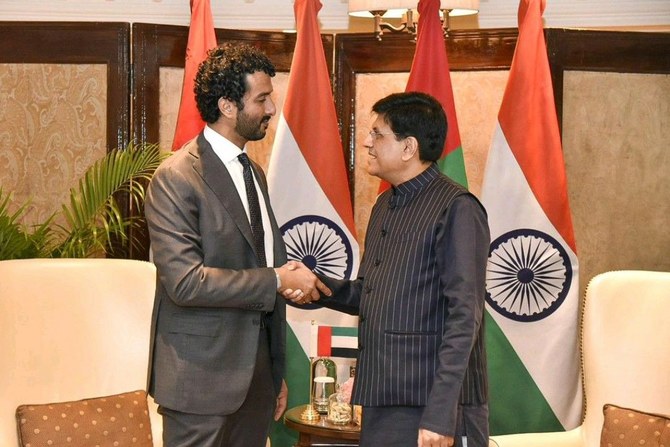
- Technology, innovation, and energy are main drivers behind the growth
- UAE ambassador welcomes increase in trade as ‘resounding success story’
NEW DELHI: A broad trade and investment pact signed by India and the UAE two years ago has boosted bilateral trade by 16 percent, with India’s top business body seeing growth, especially in the innovation, energy and technology sectors.
The Comprehensive Economic Partnership Agreement was signed by India’s Commerce and Industry Minister Piyush Goyal and UAE Economy Minister Abdulla bin Touq Al-Marri in February 2022.
It has been in effect since May 1, 2022, reducing tariffs on about 80 percent of all goods and providing zero-duty access to 90 percent of Indian exports.
The pact has since significantly advanced bilateral exchanges, as they registered a year-on-year increase of more than 16 percent, according to data from the Federation of Indian Chambers of Commerce and Industry, India’s largest and oldest trade association.
“In the first two years of CEPA’s operation, trade between the two countries has grown remarkably by 16.41 percent, showing an increase of total trade from $72.87 billion in 2021-2022 to $84.84 billion in 2022-2023,” FICCI Secretary-General S.K. Pathak told Arab News.
“Most of this growth has been registered in energy, infrastructure and construction, technology and innovation, pharma and healthcare, tourism and cultural exchanges.”
The agreement made the UAE emerge as India’s key partner in the Gulf Cooperation Council region, with both countries expecting to increase the total value of bilateral trade in non-petroleum products to over $100 billion and trade in services to $15 billion by 2030.
Citing the “growing importance of the trade relations between the two countries,” Pathak said the FICCI had “set up an office in Dubai to work closely with industry and government and support business to achieve the full benefits of CEPA.”
Supported by the UAE and Indian governments, the UAE-India CEPA Council was also established earlier this year to enhance investment, trade ties, and the implementation of the pact’s rules.
The UAE Embassy in India celebrated the second anniversary of the agreement with members of the business community in Mumbai, India’s financial hub.
UAE Ambassador Abdulnasser Al-Shaali welcomed the growth in bilateral commercial exchanges as a “resounding success story,” solidifying the long-standing economic ties between the two countries.
“Over the past two years, we have witnessed remarkable growth in bilateral trade, a testament to the immense potential that exists when our complementary strengths are harnessed effectively,” he said during the event on Wednesday.
“The CEPA has not only opened new avenues for businesses to benefit from the bilateral partnership but has also fostered deeper integration of our economies, paving the way for increased investment flows and collaboration across diverse sectors.”


